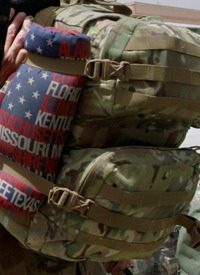
“If you're waiting for us to go, we're not leaving,” Marine General John Allen, the top commander of U.S. and NATO forces, said, according to a report in Monday's USA Today. The United States has 90,000 troops in Afghanistan, along with 30,000 from NATO allies. By the end of next summer, the American troop level is expected to be reduced the 68,000. Americans will be training the Afghan Air force until 2016, but how many troops will remain or what additional roles they will play has not been announced and may not yet be decided.
"This is a work in progress," Allen said. "The continued work beyond '14 in terms of development of economic capability and governance will continue. We will also see, probably, a U.S. military capability beyond '14."
“I don’t know what we’re going to be doing in 2014,” Ryan C. Crocker, U.S. Ambassador to Afghanistan told journalists earlier this month. A continued American military presence would be contingent on the wishes of the government in Kabul, he said. “They would have to ask for it,” Crocker said. “I could certainly see us saying, ‘Yeah, makes sense.’ ” That request will likely be forthcoming, since Afghan leaders earlier this year called for continued political and military support for at least another decade. That would extend America's military involvement to 20 years from the time U.S. forces invaded Afghanistan and toppled the Taliban government in the fall of 2001.
The decision to go after al-Qaeda forces and their allies in Afghanistan was made under the Authorization for the Use of Military Force passed by Congress after the terrorist attacks on New York and Washington on September 11, 2001.
Secretary of Defense Leon Panetta said in 2010 that no more than 50 to 100 al-Qaeda remained in Afghanistan at that time. Osama bin Laden, the al-Qaeda leader who claimed credit for the attacks, was found and killed by U.S. Navy Sea Air and Land (SEALs) forces in Pakistan in May of this year. That led to calls by some, both within and outside the Congress, to declare our mission in in Afghanistan accomplished.
“The elimination of Osama bin Laden should now prompt us to declare victory and bring our troops home from Afghanistan and Iraq,” Rep. Ron Paul (R-Texas) said at that time. Paul said the authority granted by Congress has been misused through a decade of fighting and nation-building that went beyond the goal of eliminating the al-Qaeda in Afghanistan. “With bin Laden gone, there is no reason for our presence in the region — unless indeed it was all about oil, nation-building, and remaking the Middle East and Central Asia,” he said. The Obama administration and most of Paul's rivals for the GOP nomination have supported the policy of remaining in the country to prevent a recapture of Kabul by Taliban forces and the reestablishment of Afghanistan as an al-Qaeda stronghold.
About 10,000 U.S. troops will have been withdrawn by the end of this year, the Obama administration has said. The scheduled draw down of an additional 23,000 by September, 2012 will have the troop level where it was before President Obama began the surge of additional forces in 2009 that brought the number of American troops up to just over 100,000. Western leaders at a NATO meeting in Lisbon, Portugal last year agreed to transfer responsibility for the country's security to Afghan forces by 2014. But Crocker said in his December 10 press conference, that doesn't mean Western nations will be out by that time.
“There is nothing in the Lisbon declaration on 2014 that precludes an international military presence beyond 2014,” he said. “That is to be determined by the parties, who could be numerous, not just us, as we get closer to that date.” Embassy officials insisted that the flexibility of the timeline was not a shift in policy by the Obama administration. “The president never excluded the possibility that there would be some U.S. forces here, but he stressed that security would be under Afghan lead by 2014,” said embassy spokeswoman, Eileen O’Connor. “The president has always spoken of a responsible winding down of the efforts here, so talk of the possibility of some troops still being here post-2014 is not a change in policy.”
Monday's USA Today report includes Crocker's assessment of Pakistan's role in the ongoing war against the Taliban in Afghanistan. He said it was up to Pakistan to close havens to insurgents who launch attacks on Afghanistan from across the Pakistan border. "It's going to be very hard to succeed in Afghanistan if there is not action taken to reduce the safe havens in Pakistan," Crocker said at his residence in Kabul. He ruled out, however, the use of American ground forces to attack those havens.
"We have means of reaching across the border," he said. "But the notion of U.S. troops actually moving into Pakistan has never been on the table.… It would be effectively a declaration of war on a country of 170 million people with nuclear weapons. It is not an option."


